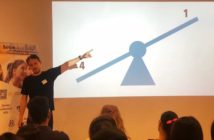Over the weekend I engaged in several mock interviews with students, and it reminded me of the power of talking and communication. This is the season where students of all types need to start, if they have not done so yet, thinking about interviews with schools or with 3rd Party companies like InitialView or Vericant. These are two very different styles of interviews and students need to be aware of the differences and prepare for them.
There are some important factors that transcend both styles of interviews. Eye contact, body language, and tone of voice are highly important. Remember that how you present your body language can give added influence to what you are talking about, e.g. leaning forward emphasizes enthusiasm about what you are talking about. Eye contact is also vitally important. It does not mean that you need to stare at the interviewer the whole time, but making eye contact also adds important context to your comments. Staring too much can be unsettling for the interview just as rolling your eyes, constantly looking at the ceiling while talking all leave a different impression than you may be intending. Smile! Smiling adds the sense that you actually like talking about your self and that the content is important. But it is not a plastered on smile that is effective, but one that is genuine.
My point is this – communication is not just what you say but how you tell your story. Yes, you students have a lot to consider. It is important to remember that the interview is really a conversation, one that is about you! Kids get so worried about what they need to say rather than being comfortable being themselves. Here’s another point – remember you know you better than anyone else. I found when I first started to speak publicly, if I didn’t believe what I was saying, I had a hard time remembering what I had to say. Since you know yourself, it is just about organizing your important qualities, interests, and ideas.
It is important to note that a school interview is very different from a IntialView or Vericant interview. In a school interview, aside from talking about yourself, it is important to speak about why the school interests you. This is one reason why a school tour usually precedes the interview. From the tour, a student can get first-hand knowledge of the school, the setting, maybe some classroom experience, etc… Being able to draw from your research and the tour or something the tour guide may have said brings a personal perspective to your conversation with the admission officer.
Third-party interviews are much shorter in time and very focused. A student really needs to have a good sense of self and self-awareness. But again, memorizing answers to possible questions may create confusion during the interview when you are asked a completely different question or not answer the question completely. It is wise to listen to the question, quickly organize one’s thoughts and dive in. More to the point, because the interview is shorter, a student must be able to condense their personal information into good example filled sound bites. Finally, there is the personal/impersonal aspect of speaking to a person while being videotaped. This can completely throw off a student and their composure. So practice in front of a mirror (pretending it is the camera) and make sure you are talking to the camera.
Throughout all of these interviews, as mentioned, it is important to highlight key facts and experiences about yourself. Be able to speak about that one or more hook (super key fact – talents in music, sports, computers, et…) that will help the interviewer key into.
Hopefully, this article will provide some things to remember or focus on when being interviewed. Just smile and be yourself. The more you practice, the less nervous you will be when the time comes to sit across from admission representatives or the camera. Good luck and enjoy – it should be fun talking about yourself!
Photo: huffpost.com




